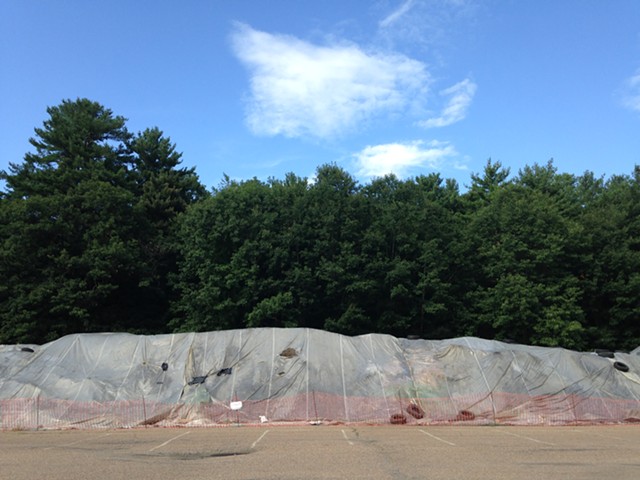
- Molly Walsh
- The dirt pile at Burlington's Leddy Park
A massive pile of dirt that has been sitting at Burlington's Leddy Park since last fall will stay there a while longer.
There's still no firm date to remove the mountain of contaminated soil that the city plopped down in Leddy's parking lot after it was excavated from the city's waterfront for the first phase of the Burlington Bike Path reconstruction.
The city has a goal, though, for disposal: All 2,500 cubic yards of dirt should be gone by winter, says Burlington Parks and Recreation director Jesse Bridges. “It's not marooned," he insists.
Residents who live near the New North End park next to Lake Champlain want the dirt gone.
"People are pretty upset with the pile," explains Dave Hartnett, the independent city councilor representing Burlington's North District.
This week, Hartnett and fellow councilor Kurt Wright (R-Ward 4) met with Bridges to press for a removal date. So far Bridges hasn't committed to one. He says more tests must be conducted on the dirt, and then he needs permission from the state Department of Environmental Conservation and the U.S. Environmental Protection Agency on how to safely dispose of the soils.
The dirt is contaminated but not hazardous, Bridges says.
That distinction is not comforting to the public, Hartnett responds. "Would you want your kids playing in a park that maybe doesn’t have hazardous materials but it's got contaminated materials? It doesn’t leave anyone with a good feeling." Neighbors are upset that the city stockpiled the dirt in the park to begin with, he said.
The city stored the soil there because a large, impervious surface was needed for what is supposed to be a temporary stockpile, Bridges said. The soil was initially going to be hauled away or possibly reused. But required testing of the dirt as it was being removed to rebuild the bike path between Perkins Pier and Penny Lane showed traces of contaminants such as lead, arsenic and, more concerning, low levels of PCBs.
The most recent tests on the dirt, which is actually organized in four piles, showed levels of PCBs at less than 7 parts per million in one of the smaller piles; and PCBs at less than one part per million in the largest pile, Bridges says. "We did find the conditions in the field as we were working and responded to them," Bridges said. "What we’re doing is trying to do the best we that we can to protect human health and well-being.”
PCBs are industrial chemicals once widely used and now considered a probable human carcinogen. Their use has been banned in the U.S. since 1979.
The sources of the PCBs probably go back decades, Bridges said. They may be from old train hydraulic fluid, electrical transformers or other sources. The waterfront was once an industrial zone with oil tanks and heavy railroad traffic.
The city maintains that the dirt poses no risk as long as people stay away from it. Temporary fencing circles the material and plastic stretches under and over the piles in the parking lot next to the Gordon H. Paquette Ice Arena and Leddy Beach. This week, weeds were growing under the plastic and there were several holes in the covering where the dirt was exposed to the air. Other holes had been patched with plastic.
It could be very expensive to get rid of the pile. If the DEC and EPA agree, the city might be able to send it like regular solid waste to the big privately-owned landfill in Coventry. This would cost $300,000 or more, and wasn't part of the roughly $700,000 construction budget for the bike path project, Bridges says.
Bridges is looking into less expensive solutions. It's possible that environmental officials will allow it to be used to make cold-patch asphalt, for example, depending on what additional tests of the soils show. Those tests are supposed to be performed this fall.
The situation could affect plans for additional reconstruction of the Burlington bike path to the north that call for a new sub-base designed to prevent cracking, Bridges added. If the soils along the next stretch are also found to be contaminated, he said, "It could make the project substantially more expensive."











Comments
Comments are closed.
From 2014-2020, Seven Days allowed readers to comment on all stories posted on our website. While we've appreciated the suggestions and insights, right now Seven Days is prioritizing our core mission — producing high-quality, responsible local journalism — over moderating online debates between readers.
To criticize, correct or praise our reporting, please send us a letter to the editor or send us a tip. We’ll check it out and report the results.
Online comments may return when we have better tech tools for managing them. Thanks for reading.